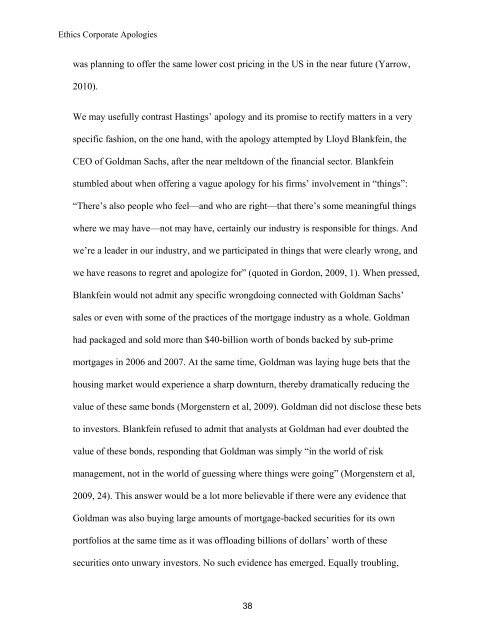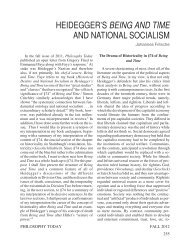Why Saying “I'm Sorry” Isn't Good Enough: The Ethics of Corporate ...
Why Saying “I'm Sorry” Isn't Good Enough: The Ethics of Corporate ...
Why Saying “I'm Sorry” Isn't Good Enough: The Ethics of Corporate ...
Create successful ePaper yourself
Turn your PDF publications into a flip-book with our unique Google optimized e-Paper software.
<strong>Ethics</strong> <strong>Corporate</strong> Apologies<br />
was planning to <strong>of</strong>fer the same lower cost pricing in the US in the near future (Yarrow,<br />
2010).<br />
We may usefully contrast Hastings’ apology and its promise to rectify matters in a very<br />
specific fashion, on the one hand, with the apology attempted by Lloyd Blankfein, the<br />
CEO <strong>of</strong> Goldman Sachs, after the near meltdown <strong>of</strong> the financial sector. Blankfein<br />
stumbled about when <strong>of</strong>fering a vague apology for his firms’ involvement in “things”:<br />
“<strong>The</strong>re’s also people who feel—and who are right—that there’s some meaningful things<br />
where we may have—not may have, certainly our industry is responsible for things. And<br />
we’re a leader in our industry, and we participated in things that were clearly wrong, and<br />
we have reasons to regret and apologize for” (quoted in Gordon, 2009, 1). When pressed,<br />
Blankfein would not admit any specific wrongdoing connected with Goldman Sachs’<br />
sales or even with some <strong>of</strong> the practices <strong>of</strong> the mortgage industry as a whole. Goldman<br />
had packaged and sold more than $40-billion worth <strong>of</strong> bonds backed by sub-prime<br />
mortgages in 2006 and 2007. At the same time, Goldman was laying huge bets that the<br />
housing market would experience a sharp downturn, thereby dramatically reducing the<br />
value <strong>of</strong> these same bonds (Morgenstern et al, 2009). Goldman did not disclose these bets<br />
to investors. Blankfein refused to admit that analysts at Goldman had ever doubted the<br />
value <strong>of</strong> these bonds, responding that Goldman was simply “in the world <strong>of</strong> risk<br />
management, not in the world <strong>of</strong> guessing where things were going” (Morgenstern et al,<br />
2009, 24). This answer would be a lot more believable if there were any evidence that<br />
Goldman was also buying large amounts <strong>of</strong> mortgage-backed securities for its own<br />
portfolios at the same time as it was <strong>of</strong>floading billions <strong>of</strong> dollars’ worth <strong>of</strong> these<br />
securities onto unwary investors. No such evidence has emerged. Equally troubling,<br />
38

















